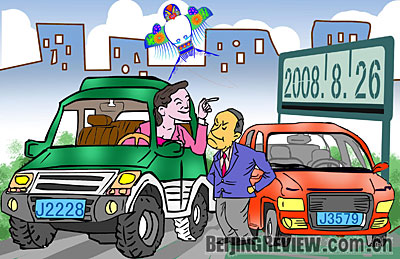|

For the duration of this year's Olympics and Paralympics, Beijing reduced vehicles on its roads every day by about 40 percent (1.3 million) through putting in place the "odd-even" car use restrictions. From July 20 to September 20, cars with license plates ending in odd numbers were allowed on the roads on odd-number calendar days, while even-numbered plates were permitted on corresponding even-number dates. The ban proved effective in easing Beijing's notorious air pollution and congestion.
As temporary traffic restrictions, they were destined to be abolished once the Olympics and Paralympics ended. Now that all cars are back on Beijing's roads, the debate over whether to consider the restrictions' permanent enforcement has stirred up much discussion, primarily because they improved Beijing's auto traveling time and resulted in bluer skies and cleaner air.
Should the car use limits stay in place now that the Olympics and Paralympics are over? A recent survey conducted by The Beijing Times newspaper showed that 68.9 percent of all respondents support keeping cars off the road. Of these, almost 83 percent of non-car owners are for extending the ban versus 48.5 percent of car owners.
Still many people are worried about making these restrictions permanent. In the survey, some car owners said they would cope with the odd-even restrictions by simply buying another car. In the long run, cars would become cheaper, so the worry of seeing more cars is likely to become true.
Some opponents of the proposed permanent implementation of the odd-even restrictions even argue that it is a violation of citizens' rights to prevent them from using their private property.
The right to drive
Deng Yuwen (Oriental Morning Post): Beijing's residents are plagued by traffic congestion and the smooth traffic during the Olympics and Paralympics let them see the effectiveness of the odd-even restrictions. Their demand to renew the temporary ban is understandable, but it seems improper for the local authority to adopt this suggestion.
In today's Beijing, non-car owners still outnumbered car owners. If the implementation of the car use restrictions is totally based on an opinion poll, the majority are likely to deprive the minority of the right to use their cars, and this is unfair.
According to the principle of conditional obedience of minority to majority, it often happens that the will of the majority is imposed on the minority and the latter's rights and interests are deprived. However, when the minority's rights are legitimate, in no way should their rights be deprived.
The Chinese Government attaches great importance to air pollution and traffic congestion in Beijing and also other cities. As for these problems, although the public is eager to see a solution, the solution should never be at the expense of the minority's interests. Strictly speaking, things that affect people's basic human rights should not be decided through voting or opinion polls.
Wang An (Heilongjiang Daily): Those who oppose the odd-even restrictions argue that they will trigger another car buying spree. The parking for unused cars will then become an even bigger problem.
But this is not the key to this problem and imposing permanent restrictions on cars will violate the public's right to freely use their own property.
During the Olympics and Paralympics, although there was no legal process to discuss whether the restrictions should be put into practice, the Beijing Municipal Government decided to exempt car owners from three months' vehicle tax and road maintenance fees, amounting to about 1.3 billion yuan ($200 million). This is a practical approach considering the short duration (two months) of the car use limits. To make the temporary restrictions permanent is a totally separate issue. Once they become strict regulations, the public's right to use their own property is affected.
When purchasing cars, car owners pay taxes in accordance with the law and they legally possess the ownership of the cars and the right to use their cars freely. And the government has the responsibility to protect their rights. But suddenly the government is tearing up that contract and depriving car owners of the right of use.
The odd-even restrictions can be practiced as regulations, but they must go through the legislative procedures and the government can only impose the regulations on cars bought after they are approved by lawmakers.
| 